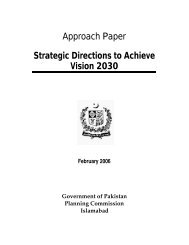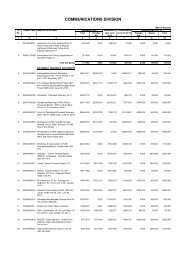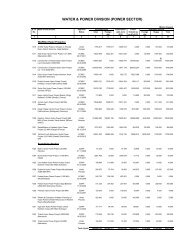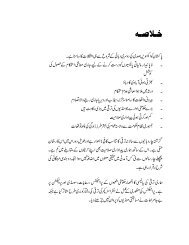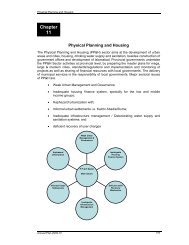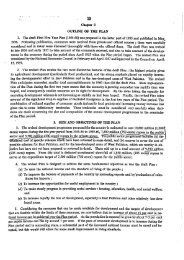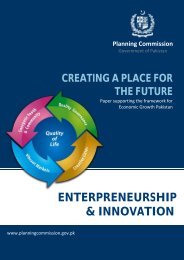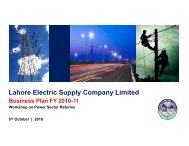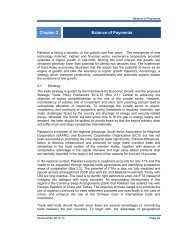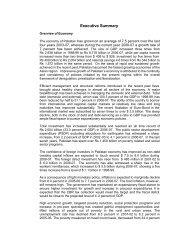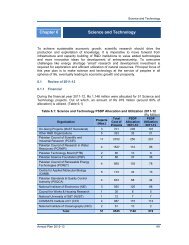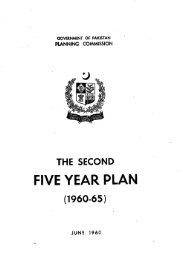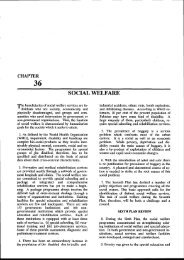Framework for Economic Growth, Pakistan - Planning Commission
Framework for Economic Growth, Pakistan - Planning Commission
Framework for Economic Growth, Pakistan - Planning Commission
Create successful ePaper yourself
Turn your PDF publications into a flip-book with our unique Google optimized e-Paper software.
International conference on “<strong>Framework</strong> <strong>for</strong> <strong>Economic</strong> <strong>Growth</strong>, <strong>Pakistan</strong>”can begin to emulate.First of all I would discuss my ideas oncreativity, the creative class, cities at urbanareas and anything more applicable to thecontext of <strong>Pakistan</strong> and the emergingeconomies. Main motivation behind all mywork is that people talk about trade ingrowth strategy, exporting as a growthstrategy, attracting investments, innovationand technology as a growth strategy; but Iwant to focus my attention on the mostfundamental quality which is shared by allhuman beings. A nice intellectual lead Imade in my research is that it is not simplytechnology, or trade, or FDI, or eveninnovation that drives economic growth butthe basic human quality of creativity whichis there in all six billion people around theworld. I think we had <strong>for</strong>gotten that. If youask me what lies behind the economic andfinancial crises is the fact that it began inUnited States and spread across the world.We tried to build an economy on trading,financial instruments, banking and onspeculations and tried to make wealth <strong>for</strong>making money in an easy way instead ofbuilding real economy based on humantalent, creativity and human capability. Thatis why I called my book not the greatestcrises, or the great crash, or the greatdepression but called it “A Great Reset”.What I was able to find by looking back atthe periods of contemporary history is that ittook twenty to thirty years to resolve theissues of the economic crises and depressionof 1930s and 1870s. But in new economiesand new economic systems it is raised basedon knowledge and creativity.So challenge today be<strong>for</strong>e us in <strong>Pakistan</strong> andacross the world is to build new andendeavoring structures, new institutions andmodels, polices and frameworks which aregeared to harness the most fundamental andmost essential key economic measure wehave which is creativity of our people. Weare living in this world of the greatesteconomic revolution of human history. Thisis greater than the shift from agriculturesociety to an industrial society. Agriculturesociety was quite disruptive because of twomassive worldwide depressions and WorldWars and it took about 100 years to build apublic policy regime called the new deal.The shift we are going today is deeper andmore elemental because <strong>for</strong> the first time inhuman history the nature that how wealth iscreated has changed. In the past we couldcreate wealth from a combination ofphysical resources i.e. raw materials,massive factories in urban industrial areascombined with labor, capital, and land toproduce things and increase our standard ofliving. But that is no longer a recipe <strong>for</strong>creating wealth now. So the key to createwealth and improve living standards lies inharnessing intellectual labor and knowledgebased production and more importantlyhuman creativity. Now this creative resourcehas become the main thrust of economicgrowth.When some people hear about my notion ofcreative economy and a creative class theybelieve that it is a latest notion. Only theadvanced cities like Silicon Valley inCali<strong>for</strong>nia or the great cities of the West,like emerging cities in China, have thatcapability. But this is a misreading. In fact inmy book I pointed out that the key economicsuccess lies not in 20% or 30% of us whohave the great <strong>for</strong>tune to be members ofcreative class working in science,technology, innovation, business, arts,culture or the entertainment but the keysuccess in 21 st century lies in harnessingcapability and creativity of everyone. Ilearnt this as a young boy by going with myfather to the factory where he used to work.My dad had education only up to gradeseven. He dropped out from school duringperiod of great depression to help andsupport his family. He worked in a factoryin industrial sector of North New Jersey.116



